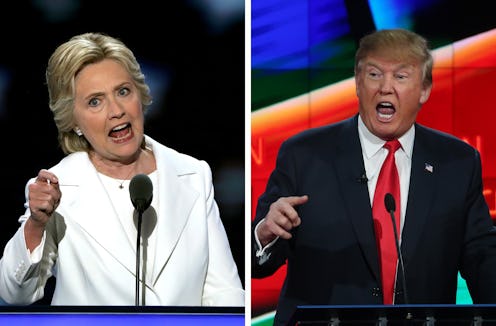News
Clinton & Trump Fans, Lay Off Mental Health Jabs
In the political sphere, August has been a month of mental health diagnoses from people with no mental health expertise. And that should stop.
On Sunday, President Barack Obama's former campaign manager, David Plouffe, told NBC News' Chuck Todd that Donald Trump is a "psychopath." On Monday, MSNBC's Mika Brzezinski echoed Plouffe, saying that Trump clearly has "some sort of problem" and should be evaluated by a psychiatrist. These remarks came just weeks after Trump called Hillary Clinton "unstable" and "totally unbalanced" at a rally in New Hampshire after the Democratic nominee said she "short-circuited" when she failed to clarify statements from her email server case interviews. Both Clinton and Trump camps should stop diagnosing their opponent with mental health issues.
The many reasons why this tactic is problematic were best summed up by Princeton University professor Eddie Glaude Jr.'s response to Brzezinski: "We can't say that ... something's mentally wrong with him as an easy way to dismiss him." Dismissing one's opponent by calling into question their mental health status uses mental health conditions as insults rather than treating them as serious issues that negatively impact people's lives and merit compassion. Beyond being morally unsound the tactic fails to engage with candidates' policy proposals on a substantive level, and that could come with a huge political cost.
For Trump, calling Clinton mentally unstable was one in a long, long line of cheap insults that he has launched against opponents left and right throughout the campaign. This is not an atypical strategy for him. It's a bit more surprising to see it coming from the left, considering that Clinton has been focused on picking apart Trump's policy proposals throughout the beginning of the general election. Those proposals, and the thinking and feeling behind them, need to be considered carefully — not just because they are held by a presidential candidate, but, more significantly, because Trump has the support of many Americans. Presumably, not everyone who's a fan of Trump could be diagnosed as a psychopath.
There are clearly other explanations besides mental illness for why Trump would behave as he does, as well as for why he holds or espouses his policy positions. He could really believe his more outlandish positions on immigrants and Muslims; if so, that doesn't necessarily make him mentally ill — racist and xenophobic, perhaps, but those aren't mental health conditions, and conflating them with such would be both inaccurate and a disservice to people with actual conditions. On the other hand, Trump could simply be saying what he thinks people want to hear in order to win — which would be selfish and irresponsible, but not necessarily sufficient for a mental health diagnosis. I don't know, because I'm not a mental health expert. But in that second possible scenario, it's still crucial that we attempt to understand the underlying thoughts and feelings of what "people want to hear," since there are a lot of them out there — instead of dismissing them as mentally ill because we don't agree with them.
It's important that we consider the many factors that might underlie different political positions. If we are to understand and effectively argue against political positions with which we disagree, it doesn't behoove us to wave away those factors in favor of a quick, but off-base, "diagnosis." Trump and Clinton supporters, and the candidates themselves, have no business making assumptions about either candidate's mental health status. Those who do so are stigmatizing a large population while failing to encourage a constructive political conversation.
